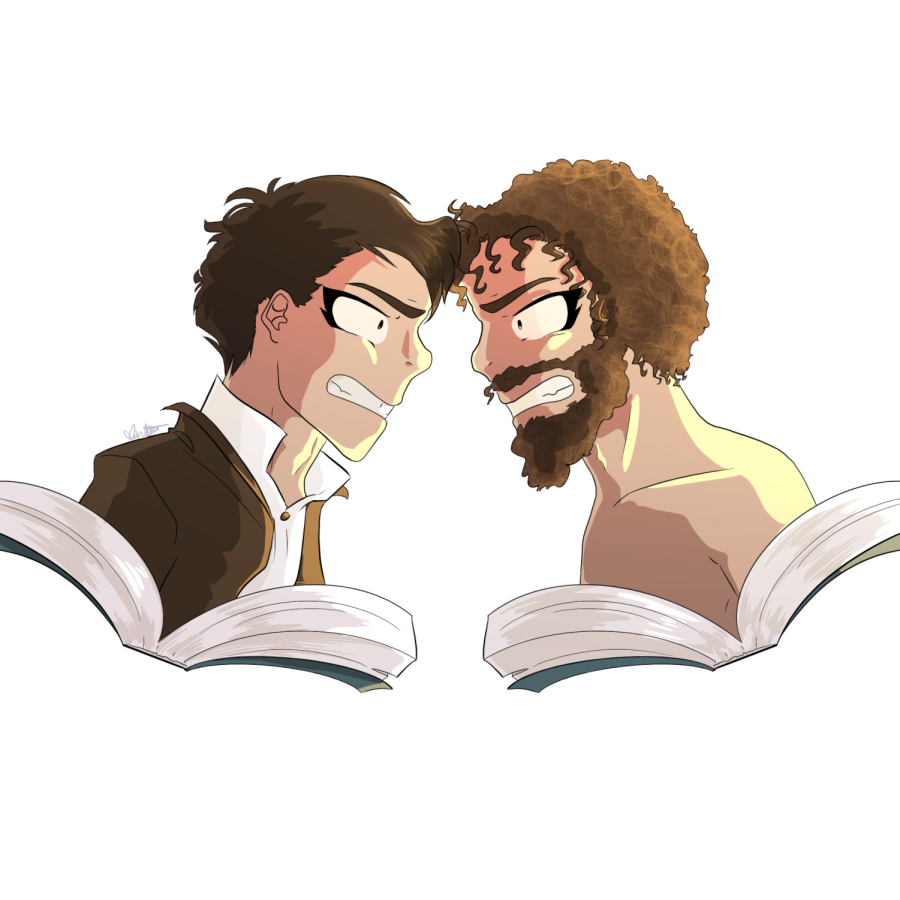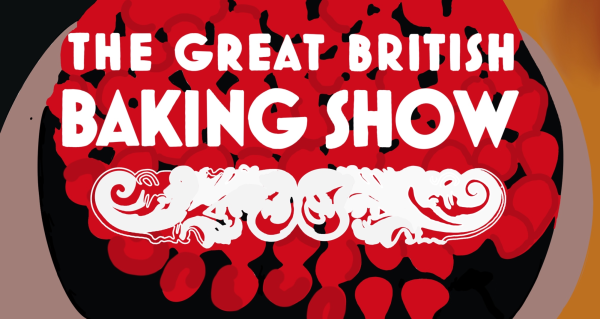To read or not to read: English curriculum book reviews
Edmond Dantès and Odysseus were both legends in their own right. One was a tortured soul seeking to be the cold hand of justice, while the other was man who was gifted with cleverness but could not see beyond his own pride.
It wouldn’t be an English class without assigned books to read. But were all books equally as engaging? To find out, we reviewed some of the past books that were in the HADV/AP English curriculum, boiling each book down to its essence. So please, heft a spoonful of salt onto your plate, settle down and brace yourself for this rollercoaster of reviews.
SPOILERS AHEAD
HADV English I:
Man is lost for 40 years across sea
Don’t tell me, O maestro, of that hypocritical hero who traveled far and wide after he had sacked the famous town of Troy. Many cities did he visit, always sailing across some mysterious wine-dark sea under the bronze sky, invading people’s homes by upholding hubris rather than hospitality. And don’t tell me about how, after decades of disappearing and warming the bed of another woman for a year, he returns to his “dearly beloved” Penelope, overwrought with jealousy of her fictional lover.
Reading this epic was like trudging through a mudslide uphill. So many lengthy sentences and archaic words made reading it very difficult. I felt like there was always some kind of analysis needed in each sentence. The plot was interesting, but the writing was too stuffy. Would I have chosen to read it outside of school? Eh, maybe on a Wikipedia article.
Boy makes windmill
Brilliant—no regrets. This nonfiction tells the tale of young William Kamkwambe and his story of building a windmill to power his home. His candid descriptions of the famines he survived and the bullying he faced only add to his achievements. His story is profound because it tells us that there is virtually no limit on the ingenuity of the human spirit. This book should be read by people of all ages; its message transcends all backgrounds.
Guy dedicates his life to revenge
Revenge is best served cold, as they say. And this book delivers the iciest, most refreshing drink of satisfaction on the hottest summer day, perhaps with just a hint of a bittersweet aftertaste. Anti-hero Edmond Dante will make you question the morality of revenge. Reading this book was an adventure in its own right: my knees were bouncing, my heart was racing and my eyes were darting as I turned each page. It was a thrilling ride, and I envy those who are reading it for the first time. To them I say, take the hand of that mysterious count and don’t look back!
Teens marry then both die
“O Romeo, O Romeo, wherefore art thou Romeo?” asks a 13-year-old Juliet, after kissing him once.
“Did my heart love till now?” 16-year-old Romeo questions, after complaining to his dearest Benvolio about how heartbroken he was over another girl just that morning.
They get married the next day.
Then die four days after that.
The fact that this is seen by some as the love story of centuries? It was not love. It was infatuation. Clearly, Romeo and Juliet were in love with the notion of love. However, Shakespeare was good at what he did. I don’t regret reading the story because it was entertaining at times, but the stupidity that was portrayed balanced it out. All in all, I was satisfied with the ending because foolish people do meet untimely ends. If only it ended quicker.
HADV English II:
Depressed teenage boy talks… about nothing… for hours
Every teenager has heard this line: “Oh I read that book as a high schooler. Couldn’t tell you what it’s about though.” And even though it hasn’t been years and years since I read “Catcher in the Rye,” I would share the same sentiments– it was, well, unmemorable. Do you want to hear the — often problematic — musings of a privileged white boy for hours on end? If you said yes, then you’re in the minority. Angsty Holden does absolutely nothing but complains and smoke and drink and then complain some more for the entire course of the book. I wish I could say there was more, but that was literally the entire plot. Oh, except for the occasional sexist or homophobic remark of course, because what book could be complete without that? Adults might say, “it is a classic,” but even they would be unable to muster up a single detail of the book’s contents besides what I already said. How’s that for a classic?
Woman goes back in time and becomes a slave
If this title sounds absurd to you, I can assure you that this book’s plot is even stranger. Set in the midst of the 1970s, a complex female protagonist is taken back in time. Back to the 19th century to be exact. Transported to a young America in the midst of greatness, you might wonder what could go wrong? A lot actually.
First, she’s in Maryland.
Second, she’s a black person… in Maryland, which was still a slave state at this point.
Third, her ancestor is a slave owner.
Who is in love with her.
This book is anything but an easy read with its twists and turns that make you whip your head back in surprise or tilt it in confusion. From its almost laughable plot to its amazingly complicated, morally gray characters, it’s the perfect book for an English class. For casual reading… not so much. It leaves your heart heavy and your head wondering “What just happened?” But if that’s your cup of tea, go ahead and take a look at this mind-boggling read.
Witch trials gone bad (actually, since when were witch trials a good thing?)
When I was told love had no boundaries, I didn’t think that statement necessarily encompassed the supernatural world. But in Abigail Williams’ case, it did! Her determination to be with a married man was admirable until she started calling witchcraft on anything with a pulse.
Why you may ask, did everyone believe a clearly insane 16-year-old girl? I couldn’t tell you. In hindsight, this book is crazy but in a good way. It’s a comedy, drama and historical fiction all in one. I can’t even begin to pinpoint a specific emotion I felt throughout this book because of its utter extreme, albeit enjoyable confusion. Amidst my emotional disarray, I enjoyed this book and would strongly urge you to read it, even beyond the classroom.
AP English Language:
A much-needed insight into one of the greatest civil rights activists
Sporting controversial views, Malcolm X was not liked by everyone. However, he laid down the groundwork for the black power movement, and in modern society, he is an inspiration for us to fight for what we believe in.
This is a rise-to-fame story, but incorporated is the civil rights movement and much-needed exposure to Islam. It gives you a first-hand perspective of how religion and culture can change an individual and a society.
Many of us only learn a few facts about Malcolm X in our history class, so this book is nice in that we get to know more about Malcolm X and his journey.
“The great American novel”
Referenced in every English class, this classic gives insight into America’s roaring 20s. The book’s language is captivating and references the idea of the American Dream and how it may look different from what society defines it as.
The Great Gatsby has it all:
Adventure.
A murder mystery.
And a little bit of burning love.
You’ve probably heard of the movie, but if you haven’t, you should wait to watch it until after you take the quizzes so that you don’t get confused with key differences.
In the novel, some of the themes are confusing and deeper analysis and insight are required to understand what Fitzgerald was trying to convey. However, with all of this, the plot was nice to follow along to and it was a good read.
Privilege takes on poverty
A wealthy woman lives in poverty. Sounds insightful, doesn’t it? However, it was quite the opposite. The author didn’t commit like she could have. Sure, it could be said that the book presents the reality of poverty in America to America, but the representation has many faults.
She broke the rules by using her money to solve her problems when things got hard, taking breaks and quitting. Personally, I’d pass on this book, but it does bring light to the harsh suffering and treatment the lower class is subject to.
AP English Literature:
Sinners or saviors?
A friar that steals from his church. A doctor who extorts money from his patients. A cook whose pus ends up in his food. Full of sin, these tales leave nothing behind.
The collection, however, presents a stark message. Corruption exists everywhere, and at this time, it was prevalent in the Church of England. This story calls for accountability, especially in our leaders, and the way it’s written makes you think about whether the character is a sinner or savior, which makes it a fun read.
Prince turned king turned outcast
This was not your traditional story where the hero saves a kingdom and is worshipped forever.
I love Greek mythology and fables, but this Greek tragedy was a little off. The main character unknowingly kills his father, marries his mother and has her children. It was quite the turn, but I liked how we knew that Oedipus was his father’s killer from the beginning. It was amusing to see his slow but sure downfall as everyone realized it before he did.
The never-ending debate about if we have free will or if our lives are bound by fate entices you as you question whether Oedipus could have chosen another path. It has important lessons about thinking about your actions because the consequences can be deathly, and that’s why it should continue to be a part of the curriculum.
Greed kills
Pure good turned evil isn’t usually a common thing in literature, but Macbeth is a prime example of it. He destroys everything in his path to becoming king, along with bringing terrible destruction after.
The bloody drama. The shocking murders. The tragic ending. These elements bring all the twists and turns you could ever want in a play. This famous Shakespeare play is bound to be one of your favorites, up there with Romeo and Juliet.
Be prepared for death because there’s a lot of it. And more death. And then even more death.
Your donation will support the student journalists of Bellaire High School. Your contribution will allow us to purchase equipment and cover our annual website hosting costs.










